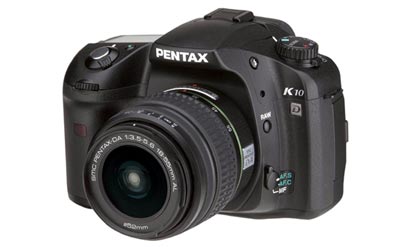10MP DSLR Shootout: Pentax K10D
If you're looking for top image quality for less than a grand, one of these rigs is your perfect 10.

We may earn revenue from the products available on this page and participate in affiliate programs. Learn more ›
10MP DSLR Shootout: Pentax K10D27075121508PentaxK10DThis pleasant surprise combines an assortment of goodies — built-in image stabilization, self-cleaning sensor, easy-to-use image controls — in the beefiest, best-sealed body of the bunch. System flexibility: Pentax has an ample current lens catalog, and given its legacy as one of the earliest players in 35mm SLRs, there is a huge stockpile of older lenses that will work on the K10D to some degree. And you can use any of them with image stabilization, as the K10D allows you to enter the focal length of an older lens so it works properly with the camera’s sensor-based Shake Reduction system. Plus, the Pentax AF360FGZ and AF540FGZ accessory flashes provide wireless TTL operation. Rank: 3 tie. Control: The K10D doesn’t have quite the smorgasbord of shooting and editing options of the Canon or Nikon, but still offers plenty. Besides sliders for saturation, contrast, and sharpness, there’s a two-axis graphic control for fine-tuning color balance; white-balance presets include three varieties of fluorescent lamp. After the shot, you can apply a variety of digital filters. You can manually select one of the 11 AF points or have the camera select it — and, yes, that’s accessed via an external dial control, too. The built-in flash, though, won’t function as a wireless flash trigger — you’ll need two accessory units for wireless operation. Rank: 4 tie. Ease of use: With its ample gasketing and sturdy construction, the K10D is the biggest and heaviest of the test cameras (though it’s neither terribly big nor awfully heavy). The upside is its excellent ergonomics, with a well-located shutter button, front and rear command dials, and jog dial. The K10D parts company with entry-level Pentax DSLRs in giving access to far more adjustments through external controls instead of menus.
This pleasant surprise combines an assortment of goodies — built-in image stabilization, self-cleaning sensor, easy-to-use image controls — in the beefiest, best-sealed body of the bunch.
System flexibility: Pentax has an ample current lens catalog, and given its legacy as one of the earliest players in 35mm SLRs, there is a huge stockpile of older lenses that will work on the K10D to some degree. And you can use any of them with image stabilization, as the K10D allows you to enter the focal length of an older lens so it works properly with the camera’s sensor-based Shake Reduction system. Plus, the Pentax AF360FGZ and AF540FGZ accessory flashes provide wireless TTL operation. Rank: 3 tie
Control: The K10D doesn’t have quite the smorgasbord of shooting and editing options of the Canon or Nikon, but still offers plenty. Besides sliders for saturation, contrast, and sharpness, there’s a two-axis graphic control for fine-tuning color balance; white-balance presets include three varieties of fluorescent lamp. After the shot, you can apply a variety of digital filters. You can manually select one of the 11 AF points or have the camera select it — and, yes, that’s accessed via an external dial control, too. The built-in flash, though, won’t function as a wireless flash trigger — you’ll need two accessory units for wireless operation. Rank: 4 tie
Ease of use: With its ample gasketing and sturdy construction, the K10D is the biggest and heaviest of the test cameras (though it’s neither terribly big nor awfully heavy). The upside is its excellent ergonomics, with a well-located shutter button, front and rear command dials, and jog dial. The K10D parts company with entry-level Pentax DSLRs in giving access to far more adjustments through external controls instead of menus.
Among many conveniences, it has both dedicated AF and dedicated exposure-lock buttons, so there’s no need to program a single button one way or the other. And Pentax has really improved its menu readouts. Oddly, there’s no AF-assist lamp; then again, we tend to dislike those. Rank: 1 tie
| Click for Image Quality Gallery |
Image Quality: Extremely accurate skin tones, but the magenta cast in shadows distracted from generally accurate colors. Saturation was a bit too high in magenta flowers, and image showed higher contrast than optimum. Shadow detail was high but there were hot spots on bright areas. Resolution and image detail were better than Canon, but just behind Nikon and Sony. Most defects absent in RAW DNG files. Rank: 4 tie
What’s missing: Some indication in the viewfinder of the extent to which Shake Reduction is operating — like the “activity bars” in the old Konica Minolta DSLRs.
Nice surprises: When was the last time you saw user-interchangeable viewfinder screens in an SLR? The K10D has ’em.
Best for: Any kind of shooting, particularly in less-than-ideal environments and weather. And a real boon for Pentax owners longing for a higher-end DSLR.
Bottom line: Pentax’s reputation as the lightweight among DSLR makers is officially obliterated with this well-made, fine-performing, highly satisfying camera.
Test Results: Excellent overall image quality throughout the ISO range. With an average resolution of 1920 lines, the K10D comes in just behind the Sony in resolution, but the Pentax put up much better noise numbers: Very Low through ISO 400, then Low at ISO 800-1600. Resolution at ISO 1600 was 1845 lines, still clearly Excellent. Price: $920, body only; $1,000 with 18-55mm f/3.5-5.6 SMC-DA AL lens. CIPA battery rating: 730 shots with 50% flash. Size/weight: 5.6×4.0x2.8 in., 1.8 lb with card and battery. Card: SD/MMC. Info: www.pentaxusa.com; 800-877-0155.
Click here to read PopPhoto’s full test of the Pentax K10D

4-10-second-f-5.0-ISO-100-SMC-Pentax-DA-10-17-Fish

1-25-sec-f-4.0-ISO-400-SMC-Pentax-DA-14mm-f-2.8-on

3-10-sec-f-5.6-ISO-100-SMC-Pentax-DA-10-17-Fisheye

1-8-second-f-3.5-ISO-100-SMC-Pentax-DA-10-17-Fishe

1-40-sec-f-8.0-ISO-200-SMC-Pentax-DA-14mm-f-2.8-on

1-200-sec-f-6.3-ISO-200-SMC-Pentax-DA-14mm-f-2.8-o

Pentax-K10D

Pentax-K10D